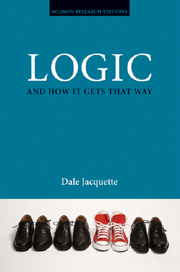Book contents
- Frontmatter
- Contents
- Preface
- Introduction: Logic, philosophy, analysis
- 1 Logical form
- 2 Monkey raisins
- 3 The secret life of truth-functions
- 4 Reference and identity
- 5 Intensional versus extensional logic and semantics
- 6 Truth
- 7 Logical and semantic paradoxes
- Conclusion: Moral lessons of logic
- Notes
- References
- Index
4 - Reference and identity
- Frontmatter
- Contents
- Preface
- Introduction: Logic, philosophy, analysis
- 1 Logical form
- 2 Monkey raisins
- 3 The secret life of truth-functions
- 4 Reference and identity
- 5 Intensional versus extensional logic and semantics
- 6 Truth
- 7 Logical and semantic paradoxes
- Conclusion: Moral lessons of logic
- Notes
- References
- Index
Summary
IDENTITY RELATA
It was Frege who first emphasized the existence of a philosophical connection between the concept of identity and the problems of reference. Frege explains their relationship in his important 1892 essay, “Uber Sinn und Bedeutung” (“On Sense and Reference”). Frege's essay, undoubtedly one of the most influential writings in the history of philosophy, sets the agenda for much of contemporary philosophy of language, as much for logicians and philosophers who take issue with its central teachings as for those who consider themselves modern-day Fregeans.
The concept of identity is at once indispensable and trivial. We need identity in order to explicate basic principles of metaphysics, and to formulate logical and mathematical equations. Identity by reputation is a reflexive, symmetric and transitive relation. Identity is self-identity; a relation that holds between a thing and itself, a = a (and, generally, ∀x[x = x]) (reflexivity); a = b → b = a (∀x,y[x = y → y = x]) (symmetry); [a = b ∧ b = c] a = c (x,y,z[x = y y = z] x = z) (transitivity). We are concerned about identity in cases of establishing uniqueness, as in Russell's analysis of definite descriptions, and in countless other applications. In practical affairs, it is often essential to determine the identity of an heiress to a fortune or the victim or perpetrator of a crime, or the substance in a certain compound.
- Type
- Chapter
- Information
- Logic and How it Gets That Way , pp. 65 - 96Publisher: Acumen PublishingPrint publication year: 2010



